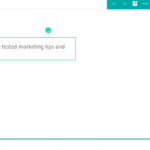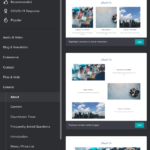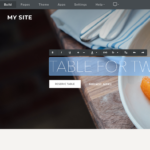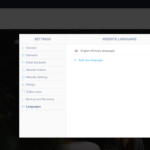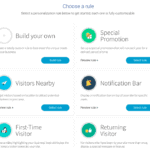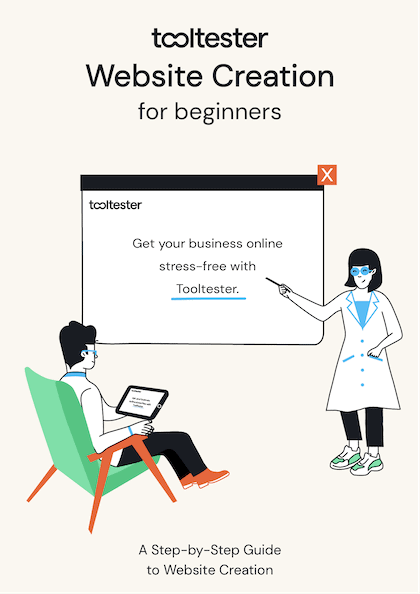Tooltester is supported by readers like yourself. We may earn an affiliate commission when you purchase through our links, which enables us to offer our research for free.
The German website builder Jimdo is a simple tool that even complete beginners can master without a problem. The traditional drag-and-drop editor (Jimdo Creator) is already super intuitive but you can also use the Jimdo Dolphin editor powered by AI, which is even easier to use. The tool takes you through a series of questions and uses your answers to automatically create a decent website draft in three minutes flat.
There’s no denying that this modern website builder can keep up with the competition in many respects. But there are some situations in which Jimdo’s smart solution is not necessarily the best choice. It might be that the features you need just aren’t available. Perhaps you want to start a blog or maybe you require a more specialized ecommerce solution. You could also simply be looking for a more cost-effective alternative.
Jimdo Pros
- Ease of use: The intuitive editor takes away the stress of building your own website. All you need to do is drag the individual elements and drop them exactly where you’d like them to appear. Then you’re free to start editing.
- Fast website creation: You can rely on Jimdo to automatically produce a website draft for you in a matter of minutes. The virtual set-up wizard will take you through a series of questions to get all the information required.
- Loading speed: Jimdo websites load impressively quickly, which boosts their SEO rankings.
- Modern designs: The templates are stylish and you can adapt them to make them your own.
- Mobile version: The responsive templates are optimized for all devices.
Jimdo Cons
- Limited features and other options: You’re going to be disappointed if you start trying to add a blog to your Jimdo website – it’s just not possible. And there’s not even an app store to give you the chance to extend the functionality. You can’t use your own HTML code either. If you need a lot of customization, a website builder may not even be the best choice.
- SEO options: Jimdo is very limited when it comes to SEO. You can only change the page title for the home page. And you’re just stuck with a general title for the subpages.
- Limited design options: There’s not all that much you can actually do in the editor. You can only change the colors and font sizes. And the editor is not very flexible when you start trying to update the design.
- No template library: The choice of templates is a little disappointing, with only two available options to choose from.
- Online store: Jimdo only works for tiny online stores. There’s no scope to sell digital products at all.
- Multilingual websites: While it’s possible to build a website in more than one language, it’s not straightforward. You actually have to give up one level of navigation to make it work.
You can read more about Jimdo in our in-depth review (or give it a go for yourself with a Jimdo free trial).
Now, let’s take a look at some of the alternatives to Jimdo along with a deep dive into their pros and cons. And we’ll be sharing our thoughts on which website builder might be best for you depending on what you’re looking for.
Jimdo Alternatives: 7 Alternatives to Jimdo Reviewed
1. Wix – More Features and Flexibility
With 200 million users, Wix is definitely a firm favorite among the website builders out there. The provider has an impressive range of templates – especially compared to the two available options you can work with as a Jimdo user. With over 800 free templates to choose from, there really is something for everyone in the Wix library. You’ll also find that you have plenty of flexibility to adapt the templates to your needs.
Even though the choice of features may seem overwhelming, the Wix website builder is still suitable for complete beginners because it’s so intuitive to use. And you can even easily incorporate a small online store into your own Wix website, with lots of key features available.
If you want to make life even easier for yourself, it’s worth checking out Wix AI. By introducing this smart editor, Wix is heading in a similar direction to Jimdo. Its artificial design intelligence automatically creates a website draft based on the answers you provide. Sound familiar?
With Wix AI, you have the option to add some handy features (like Wix Hotels) from the App Market, but you’ll need to stick with the standard Wix Editor if you want to make the most of the full range. At least Wix AI has some compatible apps, which is more than can be said for Jimdo. But Jimdo’s artificial intelligence does perform better than the Wix equivalent in terms of integrated features and the website creation process.
Wix does offer the option to create multilingual websites but they are by no means SEO-optimized. You see, you can’t change the URL slugs to translate them into the right language. But Jimdo doesn’t exactly tick the box for multilingual websites either since you have to give up one layer of navigation.
Check out our video review for a short and sweet overview of Wix:
Wix Pricing
- Free: Free website with Wix ads. No custom domain.
- Combo: $17 per month. Perfect for professional websites. Plenty of storage space and no ads.
- Unlimited: $22 per month. Ideal if you need lots of storage space (up to 10 GB).
- Business & eCommerce: $29 per month. Create an online store with Wix Premium apps included.
- Wix editor
- Edit text
- Wix Pro Gallery
- Contact forms
Wix Pros
- Design flexibility: You have much more flexibility to make changes with Wix than you do with Jimdo. And you can use your own HTML code.
- Quality (and quantity) of templates: There are literally hundreds of stunning templates to choose from.
- Range of features: Wix has so many more integrated features than Jimdo.
- Huge app market: You can take your pick from hundreds of apps to extend the functionality of your Wix website.
Wix Cons
- Responsive website: The templates are not automatically optimized for other devices, unlike the Jimdo templates.
- Ease of use: The website builder is slightly more complicated than Jimdo.
- Wix AI: The artificial intelligence option provided by Wix is not as effective because it has fewer features.
- Slower loading speed: Wix websites are slower to load, which can have a negative impact on their SEO rankings.
Why choose Wix over Jimdo?
Both tools are easy to use, with AI-powered wizards designed to make the process straightforward even for complete beginners. But if you’re focusing on features and flexibility, Wix is the better option for you. The extensive Wix App Market allows you to incorporate no end of exciting new features. And there’s a huge selection of templates that you have the flexibility to adapt to suit your requirements. The same cannot be said for Jimdo!
Wix is also the sensible choice if you’re looking to set up an online store. For example, Wix gives you the option to sell digital products too – unlike Jimdo.
> Find out more in our Wix review
2. Zyro – Ease of Use at Affordable Prices
Zyro is a website builder that’s easy for anyone to use – mainly thanks to its drag-and-drop editor. And it’s cheaper than Jimdo too. There are actually only two Zyro plans to choose from and they’re designed for people operating relatively small sites and online stores.
The Lithuanian platform has only been on the market since 2020, so the list of features isn’t excessive. And yet the features that are available are brilliant and manageable even for beginners. The AI-powered tools for website creation and content generation can take care of most of the hard work for you. And Zyro is always working hard to add more and more new features. So bear in mind that the list of features keeps on growing at record speed.
There are 150 templates to choose from – and they’re clearly structured and visually appealing. You can use them to create responsive websites that you can edit to your heart’s content.
Multilingual websites are perfectly possible with Zyro. The language switcher allows you to display your content in different languages. And the affordable plans even come with the option of a blog – albeit rather limited. But there’s no option of adding to the features with apps because there’s no app store whatsoever.
Watch our video for more on the pros and cons of Zyro:
Zyro Pricing
- Website: $9.99 per month. Basic website without ads. You can use your own domain name.
- Business: $11.99 per month. Designed for ecommerce. But the number of products is limited to 500.
- Zyro editor
- Add sections
- Editing text
- AI content writer
Zyro Pros
- Prices: Zyro offers the best value for money on the market. The tool is much cheaper than Jimdo.
- AI tools: Smart tools are on hand to help and can even help you generate content.
- Multiple languages: The multilingual website option is more effective and straightforward than the Jimdo equivalent.
- Blog: Unlike Jimdo, Zyro has a blog option – albeit rather limited.
Zyro Cons
- No app store: Following Jimdo’s lead, there’s no app store here either.
- Website size: You can’t create massive websites – as is the case with Jimdo too.
- Password protection and member area: Neither of these features are anywhere to be seen (including over at Jimdo).
Why choose Zyro over Jimdo?
Zyro is a good alternative to Jimdo if you’re working to a tight budget and don’t need any fancy features. You can rely on the various AI-powered tools to help you if you’re just starting out. You don’t even have to write your own content if you don’t want to. You can also add a blog to your Zyro website, which wouldn’t be an option if you went for Jimdo.
> Find out more in our Zyro review
3. GoDaddy – Better for Marketing Purposes
The name GoDaddy might ring a bell for some of you. The provider is a well-known player in the web hosting field. But they also offer their very own website builder.
GoDaddy provides an easy-to-use tool with decent templates for a reasonable price. It’s slightly cheaper than Jimdo, although Jimdo’s editor is easier to use though thanks to its AI website builder.
A while ago, GoDaddy revamped their former editor and released a new version called “Websites + Marketing.” This is because they’ve integrated advanced marketing features so that users now get an all-round solution that helps them get their website or online store out there. They offer a blog, social media creator, online store, and email marketing feature.
Jimdo can’t compete at this level. While it does offer an online store, GoDaddy’s option is a bit more advanced. And Jimdo doesn’t provide a blog or its own newsletter tool at all.
Find out more about GoDaddy in our video review:
GoDaddy Pricing
- Free: For simple websites. Contains godaddy.com domain. Displays an ad and some features will be limited.
- Basic: 4,99 € per month. With own domain name and without GoDaddy ad. Small number of email marketing sends and social media posts.
- Premium: 14,39 € per month. Comes with advanced SEO options. Allows up to 500 email marketing sends as well as 20 social media posts.
- Commerce: per month. Includes advanced features like online appointments, accepting payments, and recurring events. Offers a large number of email sends (up to 25,000) and an unlimited number of social media posts.
- Commerce Plus: 16,79 € per month. Includes advanced ecommerce features like the connection of credit card payment providers and abandoned cart recovery.
- GoDaddy setup
- GoDaddy editor
- Edit text
- Add sections
GoDaddy Pros
- Easy-to-use editor: Like Jimdo, GoDaddy offers an intuitive interface suitable for beginners.
- Affordable prices: GoDaddy’s plans are a bit cheaper than Jimdo’s.
- Blog feature: GoDaddy offers a blog, whereas it’s unfortunately not possible to integrate one with Jimdo.
- All-in-one marketing solution: The GoDaddy tool provides a higher number of integrated marketing features than Jimdo (newsletter tool, social media creator, and so on).
GoDaddy Cons
- Limited SEO features: Much like Jimdo, GoDaddy doesn’t offer the best options when it comes to SEO.
- No drag-and-drop function: Their editor is easy to use as it is but could be improved with a drag-and-drop function. Jimdo doesn’t offer that option either, though. If this is an important factor for you, you might want to check out Wix.
- No app store: Just like Jimdo, GoDaddy doesn’t offer an app store. There are only a few integrated features available at the moment.
Why choose GoDaddy over Jimdo?
If you’re looking for a cheaper website builder, GoDaddy is the more interesting alternative.
They also provide advanced online marketing tools that Jimdo lacks. If creating a blog or an integrated newsletter tool is important to you, you should choose GoDaddy over Jimdo.
And if you like to receive customer support by telephone and chat and not just via email and support articles, GoDaddy is the go-to option for you too.
> Find out more in our in-depth GoDaddy review
4. Squarespace – Brilliant Blogging Tool and Sleek Designs
Squarespace is the number one platform for anyone looking to boost their visibility. The impressive templates just look incredible. It’s no wonder that so many artists and creatives turn to Squarespace for their online presence.
But exceptional web design doesn’t come cheap. Squarespace will have you digging a bit deeper into your budget than Jimdo would. In return for your investment, you get a huge range of smart-looking templates and plenty of flexibility to change the one you choose and make it your own.
Ecommerce features are included with the pricier plans. Just be aware that you’ll have to pay transaction fees if you go for the Business plan, but they’re included with the Ecommerce plan. And you’re free to sell physical and digital products.
Blogging with Squarespace is pretty sophisticated, with the option to plan posts, work with multiple authors, invite comments, and get AMP support. In fact, Squarespace even gives WordPress a run for its money when it comes to blogging.
Find out more in our video:
Squarespace Pricing
- Personal: $16 per month. A good option to get you going if you don’t need an online store.
- Business: $23 per month. Marketing features included. Sales through the online store are subject to a 3% transaction fee.
- Online Store (Basic): $39 per month. No transaction fees apply.
- Online Store (Advanced): $99 per month. Full ecommerce package.
- Squarespace editor
- Templates
- Add pages
- Add sections
Squarespace Pros
- Blogging: Excellent blog with plenty of features (including multiple authors). Jimdo doesn’t even have a blog option.
- Templates: The designs are much more stylish than the Jimdo equivalents and ideal for artists and creatives.
- Ecommerce: Good ecommerce features for small online stores. There are more options here than with Jimdo.
- Page limit: Unlimited number of pages across all plans (this is only the case with the most expensive Jimdo plan).
Squarespace Cons
- Ease of use: At times, the editor can be a little counterintuitive, especially compared to Jimdo’s.
- Prices: The plans are more expensive than the Jimdo equivalents.
- Loading speed: Squarespace websites are much slower to load than websites created with Jimdo (check out our website speed experiment).
- No app store: There are only a handful of apps available (similar to the Jimdo situation).
Why choose Squarespace over Jimdo?
The template designs really are something special. They look super stylish and you have the flexibility to make them your own. Designers will be in their element with Squarespace.
Squarespace makes blogging fun too. You can work with multiple authors, schedule your posts, and so much more. Squarespace is ahead of Jimdo when it comes to ecommerce features too because there are more options available to you.
> Find out more in our Squarespace review
5. Weebly – Ease of Use with Lots of Features
With around 50 million websites, Weebly is one of the main website builders around. The platform may have lost some features when it was taken over by Square, but Weebly still has plenty to offer. And you can always add apps – an option that you don’t get with Jimdo. This gives you plenty of flexibility when you’re creating your website.
It’s often the case that website builders with lots of features are overly complicated to use. But that’s not true for Weebly. The interface is nice and clear. And websites are easy to create by dragging and dropping the elements you want exactly where you want them. The editor is so intuitive that you don’t need to allow any time to read up on it. Just get going!
And yet, Weebly isn’t quite on the same level as Jimdo when it comes to ease of use. Jimdo is still more straightforward due to the fact that it has fewer features.
Weebly has also fallen behind slightly because product development has been on hold for a while.
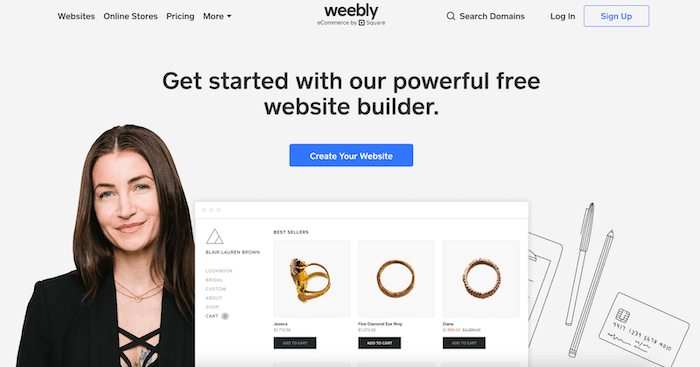
Weebly Pricing
- Free: Free plan with assigned domain and Weebly branding.
- Personal: $10 per month. Website with Weebly ads but the option to connect your own domain.
- Professional: $12 per month. Added features: video and audio player, password protection and member area.
- Performance: $26 per month. Extensive ecommerce features suitable for larger online stores.
- Weebly editor
- Templates
- Edit text
- Weebly App Center
Weebly Pros
- Ease of use: Weebly is one of the most straightforward website builders around, but Jimdo is even easier to use because it doesn’t have as many features.
- Flexibility: Weebly comes with more features than Jimdo, with the option to incorporate apps from the app store and introduce HTML code.
- Blogging: It’s a great choice if you like blogging because all the key features are covered, including comments and multiple authors.
Weebly Cons
- Development: The tool hasn’t been developed for a long while, which means that some of the features are slightly outdated.
- Multilingual websites: The website builder isn’t the best choice if you’re trying to reach an international audience. The Google Analytics code is blocked when people outside of the EU visit the website, which will have a negative impact on your tracking. Not to mention that third-party apps are not SEO-optimized for multilingual websites.
Why choose Weebly over Jimdo?
If you want to have plenty of flexibility when you’re creating your website, Weebly is the smarter choice for you. That’s because you can add extra features to your website and use your own HTML code if you want to.
Blogging is a no-go with Jimdo, while Weebly provides you with all the key blog features you’ll need like comments and multiple authors. Weebly is also the better option if you’re creating an online store. Sure, you can build a small online store with Jimdo, but Weebly’s ecommerce features are much more extensive, especially since they’re now owned by Square.
> Find out more in our Weebly review
6. Webnode – Multilingual Websites with Ease
Czech platform Webnode is one of the biggest website builders around. With more than 40 million registered users, it’s a good alternative to Jimdo for anyone looking to create a multilingual website in particular. It’s so easy to manage a website in multiple languages with Webnode. The system works with 24 languages, with support available for all of them.
You can create a small online store too. The ecommerce features were actually improved and internationalized recently. Since those updates, it has been possible to sell products in multiple currencies.
Another selling point of Webnode is its backup and restore feature, which is even available when you’re offline.
The template designs aren’t quite as modern as the Jimdo ones. And the options to add extra features are lacking too. But you do get email accounts included with even the most basic paid plan, which isn’t the case with most other providers.
Watch our video to see what else Webnode has to offer:
Webnode Pricing
- Free: Branded banner on the website and 100 MB storage space included.
- Limited: $4.50 per month. You can connect your own domain name.
- Mini: $8.50 per month. An email account is included too.
- Standard: $12.90 per month. Create a professional website in two languages. Ecommerce features are included and the ads are gone.
- Profi: $22.90 per month. Create a large multilingual website with up to 7 GB of storage space and 100 email accounts. Additional ecommerce features for small online stores.
- Editor
- Templates
Webnode Pros
- Multiple languages: Webnode is the best builder for you if you’re looking for a tool with the integrated features you need to create a multilingual website with ease.
- Email accounts: Even the most basic paid plan comes with a free email address. The more expensive plans include 20–100 email accounts, which is very generous indeed. If you go for Jimdo, you’ll only get an email address if you pay extra for it.
- Backups and restoring: The backup and restore feature is excellent and even available when you’re offline. Jimdo doesn’t offer anything like this.
Webnode Cons
- Support: Minimal support is available in the form of help resources. The support service is quick to provide answers, but you don’t always get an actual solution to your problem.
- Designs: The templates don’t look quite as modern as the ones from some of the other providers. Jimdo websites have a much nicer design.
- Number of features: Much like Jimdo, there’s not much scope to add new features.
Why choose Webnode over Jimdo?
Webnode definitely has more features than Jimdo. That makes the platform a sensible alternative if it’s important to you to have a wide range of features. Webnode might also sway you if you’re working with a tight budget. The plans are cheaper and email addresses are even included with the paid plans. Plus, Webnode is by far the better option if you want to create a multilingual website.
> Find out more in our Webnode review
7. IONOS MyWebsite – Solid All-Round Package with an Industry Focus
IONOS has made a name for itself as a website builder, having been around in the world of hosting and website creation for 25 years. The IONOS MyWebsite platform is suitable for individuals and small and medium-sized businesses.
Even though IONOS MyWebsite is designed for beginners, it’s not as intuitive and easy to use as Jimdo. Having said that, it’s worth taking the time to get used to the platform because you’ll end up with plenty of flexibility to edit and make your website your own.
There’s no risk of not being able to find the right design for your business because there are so many industry-specific templates to choose from. But if you prefer more modern templates, you’ll probably be better off with Jimdo. The Jimdo templates win hands down with their stylish design.
IONOS is ahead of Jimdo as far as multilingual websites are concerned thanks to its special integrated feature. Building a multilingual website with Jimdo isn’t easy and requires you to give up a level of navigation.
However, you’ll be disappointed if you’re looking for a free IONOS plan. But there is a money-back guarantee at least.
Want to find out more about IONOS MyWebsite? Check out our video:
IONOS Pricing
- Now: $5 per month. 1 domain and 1 email address included.
- Plus: $10 per month. More design options for experienced users. A blog and the option to build a multilingual website are included too.
- Shop Starter: $12 per month. Online store with up to 500 products. Limited options.
- Shop Plus: $20 per month. More online store features and up to 5,000 products.
- IONOS Widgets
- Personalization
- Edit text
- Templates
IONOS Pros
- Multiple languages: It’s easy to create a multilingual website, with up to 60 languages supported.
- Support: Support is provided in the FAQs, by email, on the hotline, and through the live chat.
- Blog import: You have the option to import an existing blog, which isn’t possible with most other website builders.
IONOS Cons
- Templates: There’s a huge selection of designs tailored to various industries, but they do look a bit outdated. Jimdo’s templates are much more stylish.
- No free plan: Sadly, there’s no free plan and no free trial option. But you do have a 30-day money-back guarantee.
- Ease of use: The editor isn’t always super intuitive because there are just so many features. Jimdo is easier to use.
Why choose IONOS MyWebsite over Jimdo?
If you need your website to be available in multiple languages, IONOS MyWebsite is the better choice for you. And IONOS comes with so many more features than Jimdo.
IONOS also offers you hosting options, which is a huge selling point because it means you don’t necessarily have to find a separate provider for hosting. Plus, IONOS has 25 years of experience in the world of website building. Imagine having all that expert knowledge and insight at your disposal.
> Find out more in our IONOS MyWebsite review
Alternatives to Jimdo: Which Is the Best Jimdo Alternative for You?
Jimdo is a simple and modern website builder, which can keep up with the competition in many respects. It might be that the features you need just aren’t available. Perhaps you want to start a blog or maybe you require a more specialized ecommerce solution. You could also simply be budgeting for a more cost-effective alternative.
What is that you’re looking for? Let us recommend the right alternative to Jimdo for you…
- More features: If you’re looking for more features for your small website, we’d recommend Wix, Weebly or Squarespace. All three of these platforms offer you a wide range of features so that you can easily make your website your own.
- Blog: So you want to start a blog? Then Squarespace and WordPress are the website builders for you. If you’re planning to keep your blog basic, Weebly could be another good option.
- Cheaper option: Working with a tight budget? You might want to give Zyro, GoDaddy or Webnode a go. Alternatively, you can create a small website with up to five pages using One.com for a very reasonable price.
- Small/medium online store: Both Wix and IONOS offer decent ecommerce features.
- Large online store: If you’re creating a larger online store, we recommend that you consider Shopify or WooCommerce.
And now we’ve reached the end of our article! Please leave us a comment if you have any questions or suggestions for us.
THE BEHIND THE SCENES OF THIS BLOG
This article has been written and researched following a precise methodology.
Our methodology













